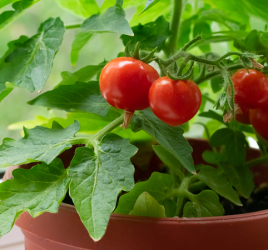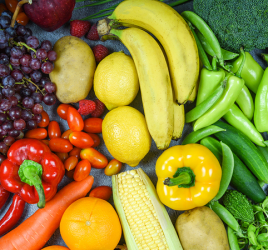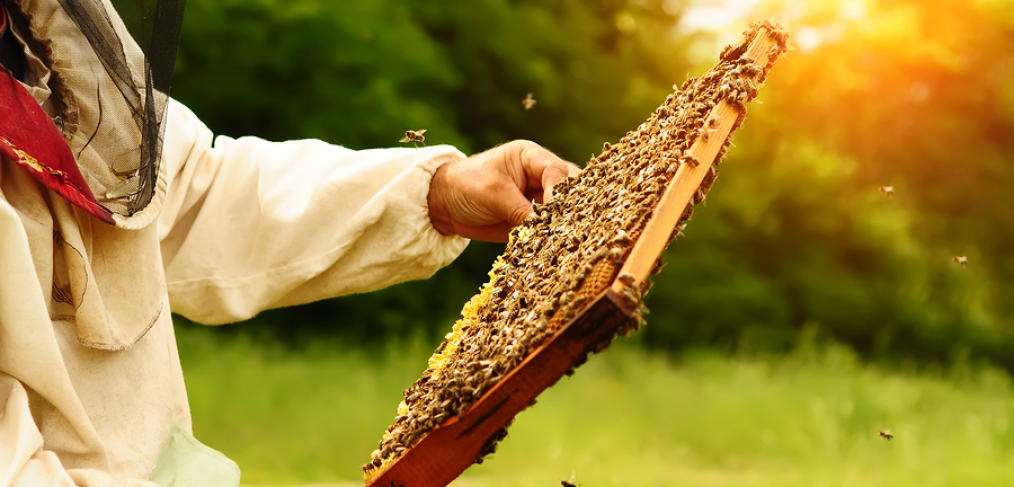
Pros and Cons of Backyard Beekeeping
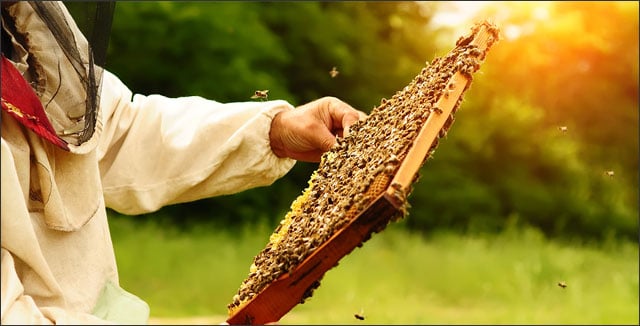
Do you dream of planting a field of wildflowers in your yard, dotted with several types of fruit trees? Do you have plans to make a strawberry patch, an herb garden, or have lots of flowers in your landscaping?
If you know anything about how plants work, you might also be thinking about bees. For example, how to attract bees to your yard, how to make them stay, or even how to keep them to harvest their honey and wax.
The Importance of Bees
As you may know, raising fruit requires the presence of bees. Some birds, wasps and other insects pollinate plants. However, bees do the majority of pollinating.
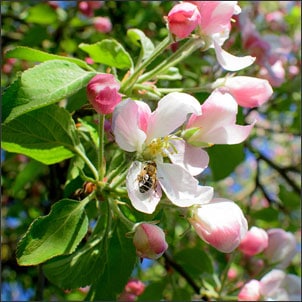
Honey bee on apple blossom
Most of the world’s most popular fruits and vegetables rely on honey bees. These commercial crops would entirely disappear without the services of the honey bees:
- Almonds
- Apples
- Stone fruits like peaches and cherries
- Citrus fruits like oranges and grapefruits
- Onions
- Watermelon
- Strawberries
- Blueberries and many more
The world’s almond crop alone – most of which is grown in California – relies on almost all of the honey bees in the United States for pollination services. They have to be shipped by truck to do their job.
Since 1994, honey bees have been disappearing in alarming numbers. At least some of this problem can be traced to the release of a new type of pesticides called systemic pesticides or neonicotinoids. This type of pesticide is taken up through the roots of the plant, and its attributes get passed on through several generations of plants.
All bees have been exposed to this pesticide for that reason. However, it is primarily the commercial honey bees who are fed a diet of corn syrup for their long treks by truck between crops. The result is called CCD, or Colony Collapse Disorder. The bees have been disappearing.
New Bee-Friendly Initiatives
Now, more than 25 years after Bayer released Gaucho, more people than ever are taking up the cause of the bees. Several of the major cities in the US have lifted beekeeping restrictions, allowing citizens to keep bees on rooftops and other locations.
You don’t have to have a big field for wildflowers and fruit trees to keep bees. Urban areas with many flowering plants are actually friendlier to bees than the large, industrial farming landscapes of the United States.
In addition, it doesn’t take much to encourage bees in your garden or to attract a wild swarm. You don’t have to collect honey and wax to get the benefits of beekeeping. The main benefits will be to your flowers and plants, which will bloom more and be much healthier if they are well-pollinated!
Pros of Beekeeping
All of the above reasons are good enough to want to provide pesticide-free blooming trees and plants for bees. By keeping bees, you will be doing a huge service to the environment, as well as conserving an endangered animal.
Honey bees will also be indispensable if you are a gardener and want to raise your own apples, blueberries, cherries, watermelon, cucumbers, and much, much more. You won’t get much yield without bees. But there’s more!
Honey and Wax
The two main reasons to keep bees are in what they produce. In addition, to being sweeter and healthier than table sugar, honey from bees that are living in your own backyard can help inoculate you against seasonal allergies by giving your body small doses of your local flora inside the honey.
If you have enough excess, you can sell your honey for profit. The same goes for beeswax, which is a healthy natural source of wax to use in beauty products and for candles, among other things. As long as you don’t over-harvest or under-harvest, you can keep taking some of the honey and wax every year!
How to Get Started
You may not know anything about beekeeping other than that beekeepers wear funny hats, and they have to carry around a smoke machine. Beekeeping can seem complicated. However, there are two things you can do right away with no training whatsoever: put up a solitary bee house or two and plant a bunch of bee-friendly plants.
A Word About Solitary Bees
Superpollinators.
If you think it’s only honey bees that are responsible for making all that delicious food, think again. Most of the world’s bee population is in the form of solitary female bees that nest, gather food, and raise young all by themselves.
Compared to honey bees, these ladies are the heavy weightlifters of the bee world. They have the advantage of being native to your area, and familiar with the plants you have around you. They can pollinate up to three times as effectively as honey bees, and they are much more docile than honey bees.
You won’t get any honey, but you will get all of the other advantages that come with bee-keeping.
To attract wild bees, you can build a bee hotel. It’s like a birdhouse, but with tube-shaped structures, wild bees like for making a nest. To learn more about wild bee hotels, please see Get to Know Wild Bee Hotels.
Another thing you can do right away without having to care for a whole swarm is to plant some or all of these plants:
- Coneflower (Echinacea)
- Giant Sunflower
- Hyssop (blue, yellow and purple giants)
- Milkweed
- New England Aster
- Purple Prairie Clover
- Showy Goldenrod
- Little Bluestem (grass)
- Prairie Dropseed (grass)
- Basil
- Bee Balm
- Dill
- Lavender
- Oregano
- Rosemary
- Thyme
- Apples
- Blackberries
- Blueberries
- Peaches
- Raspberries
- Strawberries
Getting Started Beekeeping
If you are ready to get started raising bees for honey and wax, however, the best thing you can do is to attend a meeting for local beekeepers in your area.
Many beekeeper meetings are held at local libraries. Attending a local meeting is where you will find the most relevant and experienced information about how to get started and what works best for your own backyard.
Cons of Backyard Beekeeping
As with any animal husbandry, there are downsides to keeping bees. If you are allergic to bee stings, it really isn’t safe for you. While bees are relatively docile insects, you will probably be subject to a sting or two here and there.
Some beekeepers report becoming less sensitive to bee stings over time. However, others have actually experienced developing an allergy after repeated stings.
Beekeeping isn’t, generally, a time-intensive endeavor. Twice a year the honey and wax will need to be collected, and that takes time. Otherwise, bees are very self-reliant as long as they have plenty of nectar sources.
Real trouble can come if your bees develop diseases, and there are several diseases bees can get. Some of those diseases can’t be cured, and you have to start over again with another hive.
Takeaway
In conclusion, beekeeping is one of the most worthwhile things you can do for the planet and your health. Whether you are husbanding your own swarm for honey and wax or just being an excellent host to the native bees in your area, you will reap many rewards.
You may also like to read:
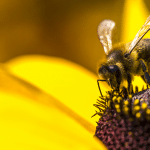
Aldi, the German supermarket chain, banned bee killing pesticides from their produce. Learn how this decision will impact other supermarkets and our world.

